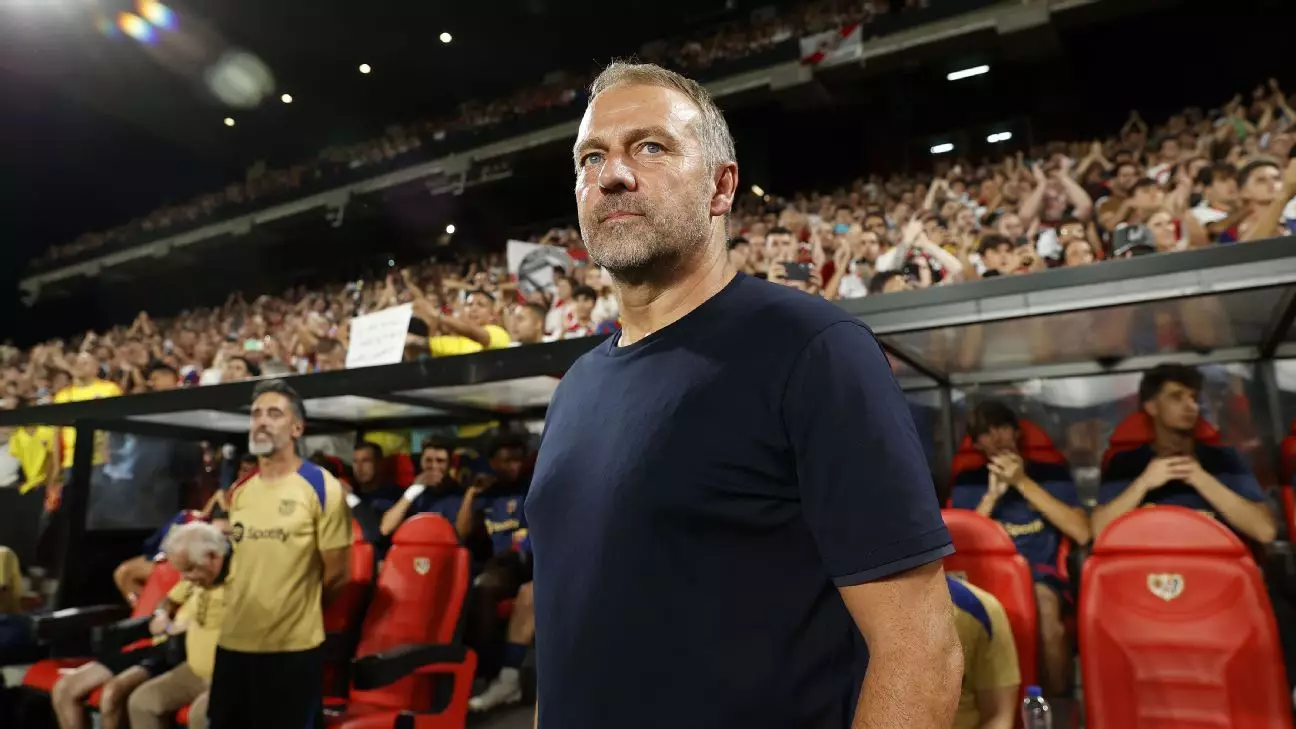Barcelona’s recent defeat against Las Palmas marked a critical juncture for the team and raised urgent questions about their tactical effectiveness under coach Hansi Flick. The 2-1 loss, which spoiled the club’s 125th anniversary celebrations, extended their winless streak in La Liga to three matches. Despite Raphinha’s goal that reignited hopes in the game, defensive errors and a lack of cohesion in the team’s overall play allowed Las Palmas to capitalize effectively. The outcome not only underscores systemic issues within the squad but also paints a troubling picture for their aspirations this season.
This sustained poor run raises concerns particularly as Barcelona prepare to face increasingly competitive rivals. Falling short despite dominating possession—holding the ball for 70% of the game—reveals a larger issue: the inability to convert chances into goals. Flick’s claim that the team is proficient in play highlights a disconnect that was conspicuously evident on the pitch. This sentiment resonates deeply when considering that even amidst vast possession and numerous shots—27 in total—Barcelona could only manage a single goal.
Flick’s strategic approach to the game appears troubled by a fundamental stumbling block: the relationship between the defensive and attacking units. His post-match reflections on the necessity of “connection” among players point to a broader concern regarding understanding and communication within the squad. This disconnect seems to stem from various players operating independently rather than cohesively, leading to detrimental outcomes, especially evident during Los Palmas’ second goal—a product of poor defending coupled with lackluster midfield support.
The coach mentioned that the issues started “in front,” suggesting that problems are not confined to the defenders alone but indicate a need for collective responsibility. In today’s football, especially within a club of Barcelona’s historic stature, players are often expected to contribute defensively as much as they do offensively. Flick’s acknowledgment of this reality underlines the challenges he faces in fostering a unified team ethos that’s crucial for success.
Despite the disheartening results, Flick maintains that confidence remains intact in the squad, which is vital as they look forward to a string of away matches against Mallorca and Real Betis in La Liga, followed by a crucial Champions League fixture against Borussia Dortmund. However, the pressure is mounting, and continuing to chalk up poor performances could fracture that confidence. Flick’s insistence on the team having “the quality” is crucial, but without consistent execution and tactical coherence, quality alone will not suffice.
Training sessions leading up to these matches will undoubtedly need to focus not just on tactical drills but on mental fortitude. A loss of belief can be insidious, especially for a club accustomed to winning, and Flick’s task involves not only refinement in tactics but also rebuilding morale. The players must rediscover their earlier form, characterized by fluid play and sharp finishing, or risk the season spiraling further out of control.
As Barcelona navigates this turbulent phase, several key players are expected to return from injury, which may provide a much-needed boost. The potential reintegration of such talents, including Dani Olmo and Marc Casadó, could enhance team dynamics and restore some much-needed depth to the squad. Additionally, the emergence of younger players like Lamine Yamal presents an opportunity for innovation and energy within the squad.
It is essential for Flick to leverage these returning players effectively to rebuild the team’s coherence and confidence. Tactical adjustments might include more structured plays that harmonize both defensively and offensively. With Barcelona’s proud heritage and a passionate fanbase, the time for action is now if they hope to reclaim their status as a dominant force in European football.
While setbacks are part of any sporting journey, the ability to learn and adapt is what separates the good from the great. As Hansi Flick confronts the pressing challenges ahead, the resilience of his players will be tested as they strive to emerge from this challenging phase stronger and more united.

